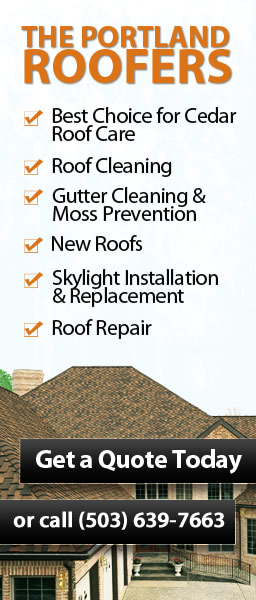Roof Types
We can install or repair any type of roof on the market. The following are examples of the types of roofs out there, what they are and the benefits of each type. If you have any questions please feel free to contact us either by phone or by filling out our contact form.
Composition / Asphalt Roofs are made of fiberglass matting and are coated with asphalt for protection. They come in a variety of styles and textures because of their popularity. They are beneficial because they are versatile and economically sound. They represent 80% of the roofs in the United States.
Cedar Wood Shake & Wood Shingle Roofs are made from cedar because cedar is light, yet durable and long lasting. If properly maintained by the right contractor with the right preservatives, you can triple the roofs life expectancy. With standard life cycles and treatment you can expect approximately 30 years from shake roofs and 20 years from wood shingle roofs. Wood roofing is not the least expensive option however the benefits (visual appeal and natural protection from the weather) have made them a popular choice in many areas.
Tile Roofs come in many styles; Spanish Tile, Flat Tile, Mission Tile, Pan Tile and Metal Tile. Among the benefits of tile roofs are that they reduce heat transfer from attics by up to 50% when compared to asphalt roofing.
Metal Roofing combines metal interlocking, standing seam, metal shingles and copper. The styles come in mostly large panels that can be customized and vary in color, tone and type. Metal roofing can be costly but the benefits are durability, longer life and being more fire retardant.
Flat Roofs & TPO are the most complex and feature a combination of PVC, TPO, and EPDM materials. The style for this type of roof is flat with mostly asphalt service. It should be noted that they are subject to high levels of water retention but have the benefit of being able to equip solar panels for solar energy quite easily.
Torch Down Roofing, made of modified bitumen, is widely used for roofing on flat roofs. Its name is derived from the method of torching the bitumen sheets onto a fiberglass base sheet in the roofing overlap areas during torch down roofing installation. The material used in the roofing torch down process is also sometimes known as rubberized asphalt. Melting of the bitumen by torching creates highly resistant and durable roofing. Because of this, torch-down roofs are long-lasting, with an average life span of up to 20 years. One of the big advantages of torch down roofing is its ability to protect the roofing from rainwater. Although it is slightly more expensive, the roofing torch down method is generally regarded as preferable to the alternative method of roofing used for flat roofs involving the use of tar and gravel.










